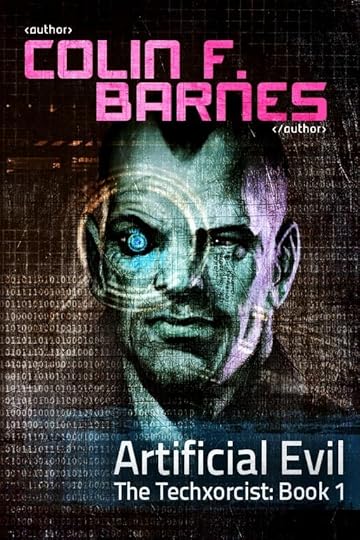Cyberpunk by Colin F. Barnes
This week I have a special treat in the form of a guest post by author Colin F. Barnes.
Colin is a writer of dark and daring fiction. He takes his influence from everyday life, and the weird happenings that go on in the shadowy locales of Essex in the UK.

Cyberpunk is one of those evocative words that often gets used in marketing for video games, films, and other visual arts. And for very good reason: the genre often features extrapolations of fashion, technology, architecture, and even physical appearance. So it naturally lends itself to a visual medium. See Blade Runner, or Ghost In The Shell as prime examples of this. But how does this sub-genre of science fiction portray itself in literature?
Hyper Reality and Interconnected Societies
One cannot talk about Cyberpunk in literature without referencing William Gibson’s classic novel, Neuromancer. It’s a touchstone of the genre and should be one of the first stops for anyone new to the world of cyberpunk. Within this book, Gibson expertly describes a near future where senses are turned up to the maximum; cities are illuminated by neon and giant screens, and humanity has augmented itself with technology. We are increasingly seeing a lot of this happening around us today.
One of the interesting things about Neuromancer is the prediction of the web and the Internet; this is a common theme amongst Cyberpunk—especially from the 80s where computing was just coming into the homes of ordinary people, and authors extrapolated how we would interact with the technology. Many stories feature networked computer systems, artificial intelligences, and characters that can manipulate these technologies.
More Than Just Technology
It’s fair to say that a lot of cyberpunk stories are centred on the technology and the humans that manipulate it to increase their talents/senses. But an often-overlooked aspect is the ‘punk’ part. Anarchic and dystopian settings regularly feature in a good cyberpunk story. The characters tend to be those living just outside of society’s rules: often criminals, hackers, or people intelligent enough to slip between the cracks and use the broken society to their advantage.
As we enter the information age, those who can control, aggregate, or create that information are the ones that rise to the top. We can see this today with the likes of Google, Facebook, and Twitter generating vast databases of information all generated by the people. A typical punk protagonist tends to be against the establishment, or looking for ways to break free from their increasingly restrictive grasp on their lives. In some senses, you could say these punks are anti-heroes. Much like the punks of the 70s.
Variations and Placement on the SF spectrum
Cyberpunk, much like horror or steampunk, can sometimes just be a flavour set atop another genre, or it can be wholly cyberpunk. It’s usually considered a sub-genre of science-fiction, and usually at the more realistic end as opposed to the more speculative end of the spectrum with such things as Space Opera or far-future stories. It’s not uncommon to find thrillers and noir settings with the Cyberpunk realm, especially as we move away from the 80s and early 90s where it had its heyday. We now see combinations of genres, such as cyberpunk/thriller, as our own technology starts to approach—and sometimes surpass—that of what was predicted in earlier novels.
It’s certainly a rich set of tropes and ideas that can be applied across the board of all speculative fiction. My own cyberpunk story, The Techxorcist, could be classified as a horror/sci-fi/thriller mashup, in that the story takes place in a cyberpunk future, but with elements of those other genres still visible within the tale.
I’d just like to take moment to thank Colin for his excellent post. You can find more about him here:
Website: www.colinfbarnes.com
Twitter: http://twitter.com/#!/ColinFBarnes
He also has a new book out.

Artificial Evil: Book 1 of The Techxorcist is available as a paperback and ebook from:
Print $10.99 (£6.99)
Anachron Press | Amazon US | Amazon UK
eBook: $4.99 (£3.20)
Anachron Press | Amazon US | Amazon UK | Kobo


Steve McHugh - Writer
- Steve McHugh's profile
- 1887 followers



